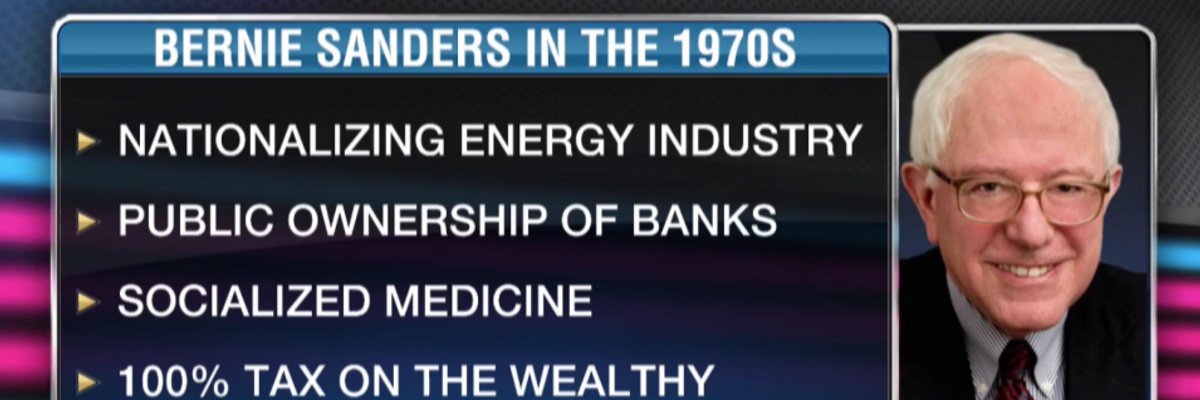On the same day moderate Texas Democrat Beto O'Rourke declared his candidacy for president, CNN published an exclusive report: Bernie Sanders in the 1970s urged nationalization of most major industries.
"I favor the public ownership of utilities, banks and major industries," Sen. Sanders told the Burlington Free Press in 1976, according to CNN. "We need public control over capital; and the capital must be put to use for public need, not for the advancement of those who made the investments."
The CNN reporters who broke the story made it clear why they thought it was such a scoop.
"Many of the positions he held at the time...could provide fodder for moderate Democrats and Republicans looking to cast the Democratic presidential candidate and his beliefs as a fringe form of socialism that would be harmful to the country," CNN reporters Andrew Kaczynski and Nathan McDermott wrote.
It is virtually certain that Sanders will be asked to disavow these comments at some future public forum, debate, or town hall meeting. But the Left shouldn't allow our enemies to use Bernie's 1976 third party campaign platform against him. The ideas Sanders articulated back then are potent potential solutions to many of the major social problems still facing U.S. society today.
Democratic ownership of the economy may not be a mainstream talking point right now, mostly because the collapse of the Soviet Union combined with a weak American labor movement has made talk of nationalizing industry politically untenable, at least according to conventional wisdom.
But as Sanders has pointed out ever since announcing his 2020 candidacy for president, Medicare-for-All, a $15/hour minimum wage, and free college tuition weren't considered politically realistic policies until very recently either--not until after his 2016 campaign and years of movement demands in the streets elevated them in the public discourse.
Today, the mainstream debate over corporate control of our economic system (and therefore, our political system) is mostly limited to labor law and progressive tax reform--and tougher antitrust enforcement.
These are sorely needed, but they won't, on their own, end inequality. The next best thing to breaking up the largest multinational conglomerates might just be public ownership of them. Especially if nationalization is paired with a strong public-sector labor movement that can exert independent worker control over the entire industry, and force government into a co-management arrangement from across the table.
The Bernie Sanders of 1976 had other good ideas. Eighteen years before NAFTA, Bernie proposed a solution to globalization, capital flight, and deindustrialization that is virtually never talked about today.
According to CNN:
"We have got to begin to deal with the fact that corporations do not have the god-given right to disrupt the lives of their workers or the economic foundation of their towns simply because they wish to move elsewhere to earn a higher rate of profit," Sanders said.
Sanders' plan would require large businesses attempting to leave cities to get permission from the towns and the workers in them. If the company did not get that approval they would be required by law to pay a guaranteed two years of severance for workers and 10 years of taxes for the town.
Nationally, Sanders said, legislation corporations leaving cities would have to be dealt with by turning the means of production over to the workers.
"In the long run, the problem of the fleeing corporations must be dealt with on the national level by legislation which will bring about the public ownership of the major means of production and their conversion into worker-controlled enterprises," he said.
This may all sound great to many Common Dreams readers and progressives more broadly, but CNN didn't print this story to help the political revolution. It was published to help fuel attack ads against Bernie and the democratic socialist movement. It is probable that the new archive of Liberty Union Party material at the University of Vermont will continue to be mined by establishment Democrats, Republicans, and the corporate media alike for even more ammunition to use against Sanders in the days and weeks to come.
But by doing so, outlets like CNN are also opening the door for supposedly out-of-mainstream policies like democratic control of the economy to re-enter the realm of acceptable opinion. That's an opportunity the Left should take advantage of. By doing so, we can play rearguard defense, watch Bernie's back, and turn the tables on reactionary Democrats with an embrace of the seemingly off limits, pushing the envelope of what is possible forward even more.
